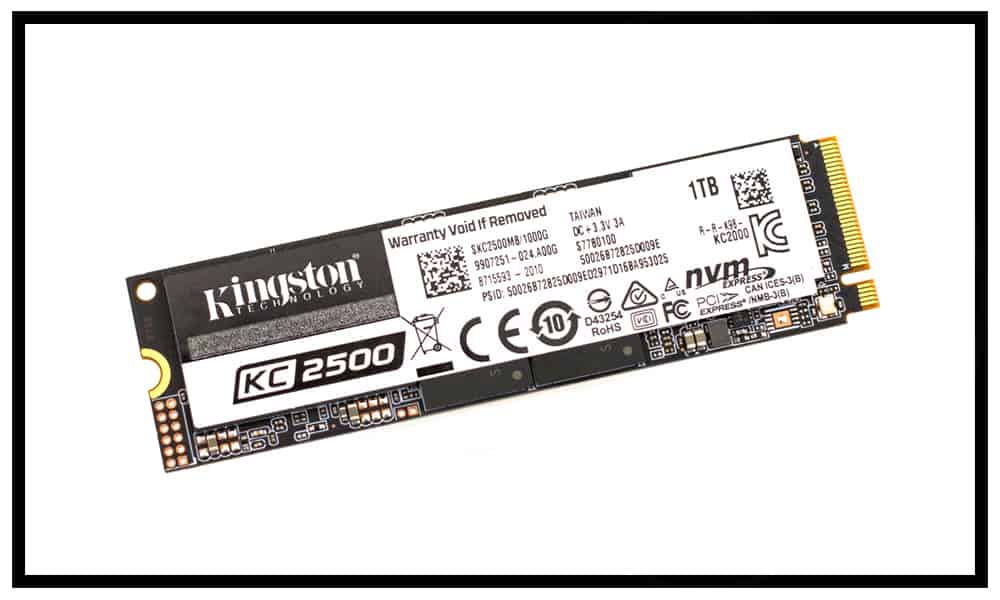Hardware
Kingston KC2500 M.2 NVMe SSD Review

Introducing Kingston’s KC2500 M.2 NVMe SSD
As time marches on, it’s looking like we may eventually move away from magnetic disk drives. Solid-state drives are not only faster than their magnetic counterparts, but the price gap is narrowing. Kingston sent out one of their latest M.2 NVMe solid-state storage drives for us to check out. With 1TB of storage and some impressive manufacturer specs, the KC2500 looks really promising. Let’s check it out.
Straight from the manufacturer: The Kingston KC2500 M.2 NVMe SSD
“Kingston’s KC2500 NVMe PCIe SSD delivers powerful performance using the latest Gen 3.0 x 4 controller and 96-layer 3D TLC NAND. With read/write speeds up to 3,500/2,900MB/s1, KC2500 delivers outstanding endurance and improves the workflow in desktop, workstations, and high-performance computing (HPC) systems. The compact M.2 design gives greater flexibility, increasing storage but also saving space.
Available in capacities from 250GB–2TB2 to meet your system’s needs. KC2500 is a self-encrypting drive that supports end-to-end data protection using XTS-AES 256 bit Hardware-based encryption and allows the usage of independent software vendors with TCG Opal 2.0 security management solutions such as Symantec™, McAfee™, WinMagic® and others. KC2500 also has built-in Microsoft eDrive support, a security storage specification for use with BitLocker.”
KC2500 M.2 NVMe SSD Manufacturer specs:
| Form Factor | M.2 2280 |
| Interface | NVMe™ PCIe Gen 3.0 x 4 Lanes |
| Capacities | 250GB, 500GB, 1TB, 2TB |
| Controller | SMI 2262EN |
| NAND | 96-layer 3D TLC |
| Encrypted | XTS-AES 256 bit |
| Sequential Read/Write1 | 250GB – up to 3,500/1,200MB/s 500GB – up to 3,500/2,500MB/s 1TB – up to 3,500/2,900MB/s 2TB – up to 3,500/2,900MB/s |
| Random 4K Read/Write1 | 250GB – up to 375,000/300,000 IOPS 500GB – up to 375,000/300,000 IOPS 1TB – up to 375,000/300,000 IOPS 2TB – up to 375,000/300,000 IOPS |
| Total Bytes Written (TBW)3 | 250GB – 150TBW 500GB – 300TBW 1TB – 600TBW 2TB – 1.2PBW |
| Power Consumption | .003W Idle / .2W Avg / 2.1W (MAX) Read / 7W (MAX) Write |
| Storage Temperature | -40°C~85°C |
| Operating Temperature | 0°C~70°C |
| Dimensions | 80mm x 22mm x 3.5mm |
| Weight | 250GB – 8g 500GB – 10g 1TB – 10g 2TB – 11g |
| Vibration Operating | 2.17G Peak (7-800Hz) |
| Vibration Non-operating | 20G Peak (20-1000Hz) |
| MTBF | 2,000,000 |
| Warranty/Support4 | Limited 5-year warranty with free technical support |
Testing the KC2500 M.2 NVMe SSD
Testing was completed with the following hardware:
- Custom built PC
- ASRock X570 Phantom Gaming 4S
- AMD RYZEN 5 3600
- ASROCK Radeon RX 5500XT
- CORSAIR Vengeance LPX 16GB (2 x 8GB) 288-Pin DDR4 SDRAM DDR4 3600
- Crucial BX500 240GB Internal SSD
- Windows 10 operating system
Testing software:
Crystal Disk Mark (CDM) – An open-source disk drive benchmark tool for Microsoft Windows. Based on Microsoft’s MIT-licensed Diskspd tool, this graphical benchmark is commonly used for testing the performance of solid-state storage. It works by reading and writing through the filesystem in a volume-dependent way.
Anvil Storage Utilities (ASU) – Anvils Storage Utilities is a freeware SSD benchmarking application: Endurance and benchmark testing tool for analyzing the performance of both solid-state and traditional hard disk drives. ASU test throughput as well as IOPS and Disk Access Times. It features a preset SSD benchmark and is also capable of performing endurance testing and threaded I/O read, write, and mixed tests.
ATTO Disk Benchmark (ATTO) – Is a robust hard disk and solid-state storage benchmarking tool. Several options are available to customize your performance measurement including queue depth, overlapped I/O, and even a comparison mode with the option to run continuously. ATTO Disk Benchmark can be used to test any RAID controller, storage controllers, host adapters, hard drives, and SSD drives, or another solid-state storage medium that interfaces as a drive in your system.
Testing results

The Kingston KC2500 1TB managed 3415.1MB/s read, and 2295.8MB/s write on the SEQ1M Q8T1 test which simulates 8 sequential operations at once utilizing a single thread. This simulates moving large files such as photos or videos from the card to a PC, saving a burst of photos from your DSLR to the card or writing a continuous video file to the card.

When testing using Anvil’s Storage Utilities, we find very similar numbers to those that we found when benchmarking with Crystal Disk Mark. Sequential 4MB file operations averaged to 2834.6MB/s while sequential write operations averaged to 1783.2MB/s.

The results from ATTO were within the same range of the previous two tests with 4MB sequential read speeds averaging out to 2.2GB/s and write speeds averaged to 3.19GB/s.
Final Thoughts on the Kingston KC2500 1TB NVMe SSD
Overall, the Kingston KC2500 1TB NVMe SSD drive performed above my expectations. With pricing around $150 USD at the time of this writing, it’s a pretty good deal. Yeah, it may be a little pricey for one terabyte, but this drive really shines when it comes to speed. I think I’ll be moving to more NVMe drives in the future. At least for OS drives. When you think about it, it really makes sense. Clean up your PC build by eliminating SATA power and data cables while also gaining a significant boost in drive performance.


ProClockers would like to thank Kingston for providing this sample for our review.
Product support page:
https://www.kingston.com/unitedstates/en/ssd/kc2500-nvme-pcie-ssd






